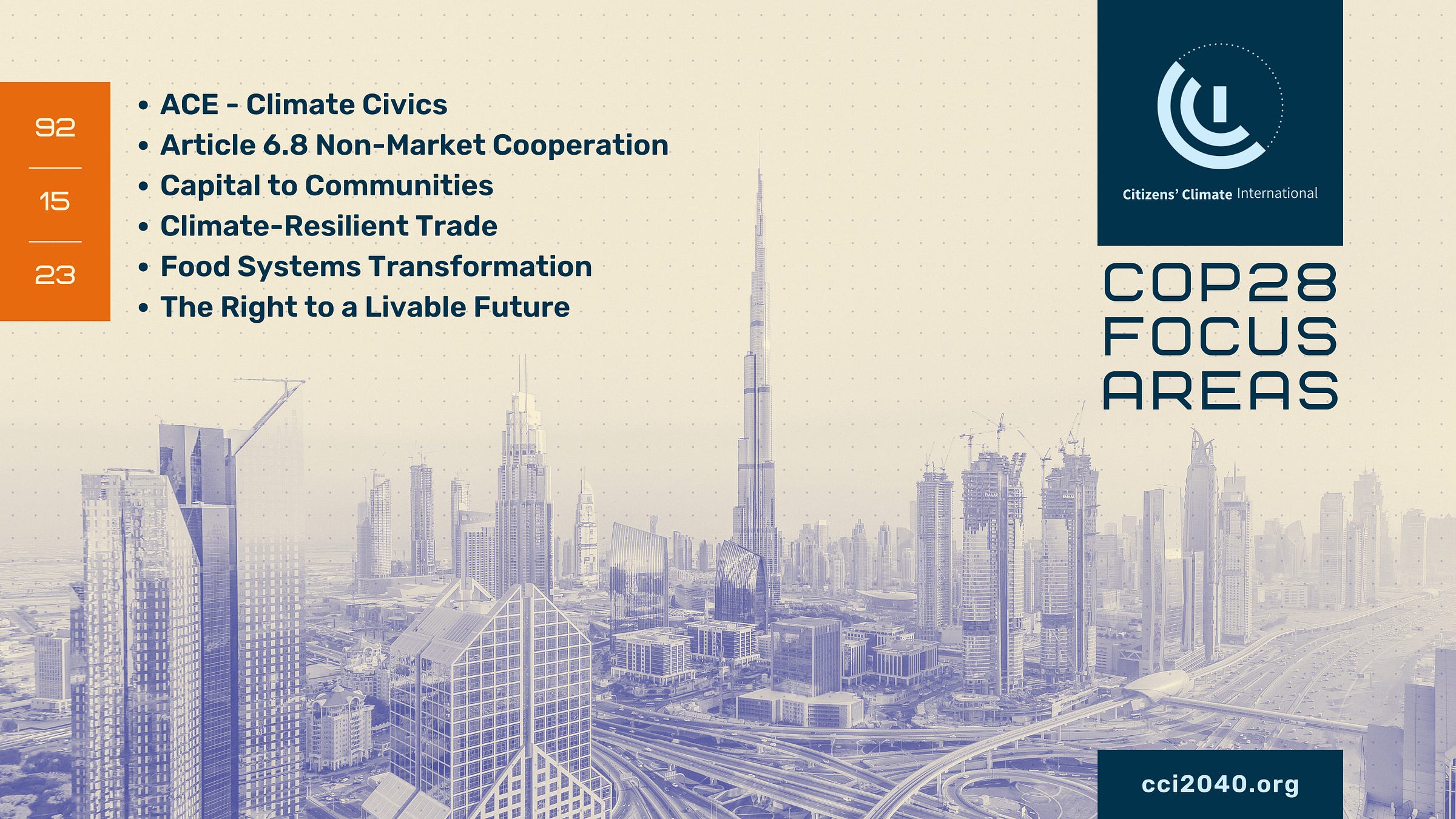CCI focus areas for upgrading global climate ambition & action
The right to resilience, supported by climate civics, participatory finance, climate-resilient trade, food systems transformation, and non-market cooperation to catalyze action across all of them.
This week, we announced CCI’s thematic focus areas for work on the table at COP28. Our approach emphasizes what we know from science and evidence, the basic principles surrounding human rights and legitimacy in international law, and areas of work that provide leverage for upgrading real-world action, starting now:
National climate plans must be upgraded to be economy-wide, include all global heating pollution, and accelerate timelines to zero emissions, to align with The Right to a Livable Future.
To support this, we are focusing on Action for Climate Empowerment (climate civics), Capital to Communities, climate-resilient trade, food systems transformation, and non-market multilateral cooperation to pull them all together.
We released with this agenda a reference graphic structured to evoke the fact that we are living through a design era, in which decisions at all scales will have a powerful impact across near-term, mid-range, and far-future timeframes.
We also published a new landing page for CCI-related activities at and around COP28, at the short-link: cci2040.org. The short-link is meant as a reminder that we need to accelerate action to avoid breaching 1.5ºC of global heating, which the IPCC reports we are on track to breach by 2040.
The landing page links to:
Our briefing note on COP28 Focus Areas;
the Earth Diplomacy Leadership Initiative—the series of workshops we co-host with The Fletcher School of Law and Diplomacy at Tufts University;
the People’s Pavilion digital platform;
the 2023 Reinventing Prosperity Report: The Right to Resilience—which will be released during the first week of the COP28;
the COP28 side event CCI will co-host, which will launch the Good Food Finance Facility—a new co-investment platform for food systems transformation;
the CCI Blue Notes website, which features briefing notes, formal submissions to the UNFCCC and other multilateral processes, and select reports;
an extensive COP28 Resource Library, for those who like to, or need to, dive into the complexity of the process.
Our Focus Areas
The Right to a Livable Future (also the right to resilience) should serve as a new global framing to raise ambition and accelerate mobilization. All people have a transcendent right to expect, demand, and uphold the principle that resilience is a baseline imperative. This translates into a need for:
Active protection of other climate rights;
A strong, clear, and actionable zero-harm outcome on the Global Goal on Adaptation;
An invitation to active civic participation in climate-related decision-making (more on this below);
Accelerated mobilization to decarbonize industrial systems and reduce future climate risk, harm, and cost;
Expanded finance for adaptation and resilience measures, across whole economies;
Urgent mobilization of funds for overcoming loss and damage, including direct support to communities in need;
Sharing of science, technology, and sustained support for robust, actionable early warning systems;
An integrated and holistic approach to climate-resilient development, across the SDGs.
Action for Climate Empowerment (ACE) is essential, to support every stakeholder, community, country, and region, having the best chance of succeeding against this unprecedented—and worsening—global challenge. For us, this is often about the participation of stakeholders in decision-making. But all six elements of ACE—education, public awareness, training, public participation, public access to information, and international cooperation—are integral to ensuring we have vibrant, informed civic spaces primed for the hard work of making climate-resilient development and prosperity possible. ACE countries, those that lead in active, participatory climate mobilization, will be the leaders that shape the climate-smart future.
Capital to Communities is shorthand for a strategy we outlined in the 2022 Reinventing Prosperity Report, to allow stakeholders and communities to participate in the design, deployment, and monitoring of climate-related financial flows and economic development strategies. The Capital to Communities approach matters, because we don’t have time for costly large-scale errors based on mistaken assumptions about conditions on the ground; we also need to know that deployment of resources is being tracked—not only by interested parties and experts, but by people who live with the consequences of fast-moving climate investments.
Food systems are the major global industry most intimately connected to everyday human health and wellbeing. Our current model is not working: we are seeing record numbers of people facing food insecurity, even as climate stresses make it harder for key regions to reliably produce enough food, and natural systems vital for food production are deteriorating and at risk of collapse.
There is no path to climate resilient security and prosperity without a rapid transition to food systems that are climate-smart, sustainable, and able to produce affordable nutritious food for all.
At COP28, CCI is supporting a major side event featuring the launch of a new financial mechanism for food systems transformation.
We are also linking our Volunteer Empowerment program to the food systems work, through a Food, Finance, and Democracy project—aimed at providing stakeholders with input into policies that shape agriculture, local economies, delivery of climate finance, and community-level experience of food systems.
We recognize and support the Non-State Actors Call to Action for Transforming Food Systems for People, Nature, and Climate, and recommend commercial, financial, and nonprofit entities sign on to support it, and join the work of reshaping food systems.
Climate-resilient trade is a critical lever for mainstreaming of climate action across the everyday economy. A coordinated effort to phase out new fossil fuel development and to reach net zero as soon as possible will require climate-aligned trade agreements; the COP28 should emphasize the need for aggressive decarbonization and support coordinated cooperative action to decarbonize trade and finance flows, while ensuring the benefits of trade to all involved. And: aligning trade relations with a climate-resilient future is a necessary part of the process of alining all financial flows with Paris Agreement goals, as called for in Article 2. For further detail, read our blue note on how trade can deliver a climate smart future.
Non-market multilateral cooperation under Article 6.8 of the Paris Agreement is a way to activate real-world change in line with all of the above. “Non-market” effectively means any form of international cooperation that is not emissions trading.
Non-market approaches could include financial regulations, financial delivery, technology and data sharing, border adjustments, agricultural cooperation, and trade.
Nations can leverage climate income policies and other non-market modes of pollution pricing to shift incentives at the national and multilateral levels.
Non-market approaches can provide a mechanism for the voluntary race-to-the-top so long talked about and now so urgently needed, while mainstreaming economic development strategies oriented toward reducing vulnerability and creating conditions for climate-resilient security and prosperity. (Note the 2014 PARIS Principles that served as input to the development of Article 6.8.)
We outline some examples here.
The People’s Pavilion
Whether you attend the COP28 as an accredited delegate or not, you can engage with the process through the People’s Pavilion digital platform, supported by the VoLo Foundation and a network of allies.
The platform: PeoplesPavilion.net
Grand Opening event: bit.ly/peoplespavilion



